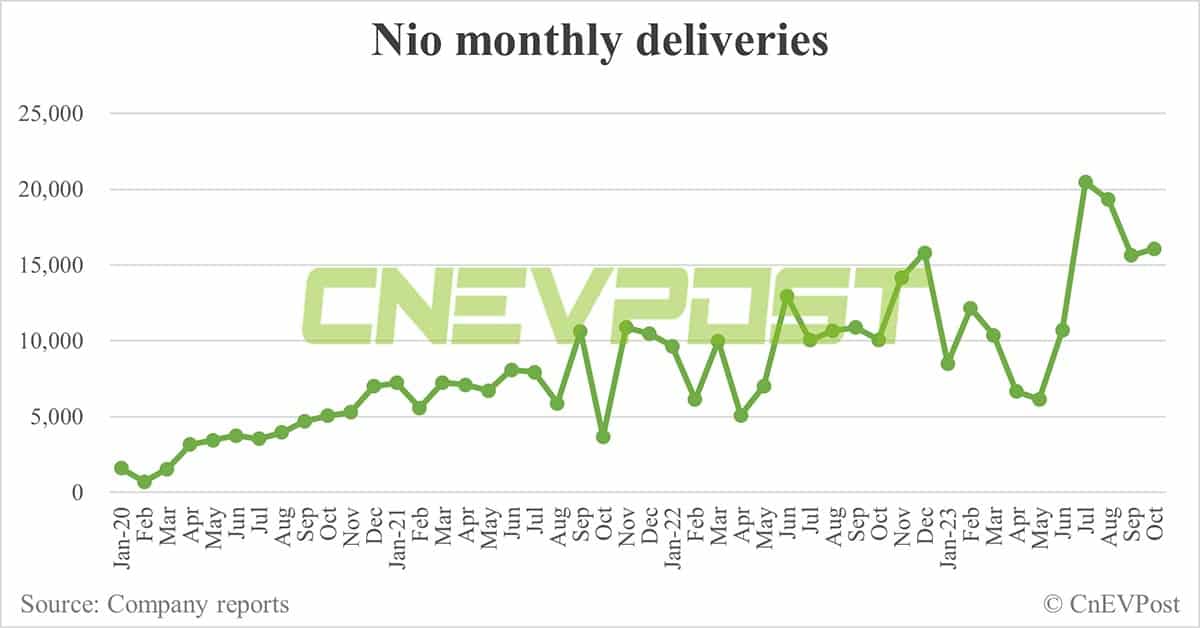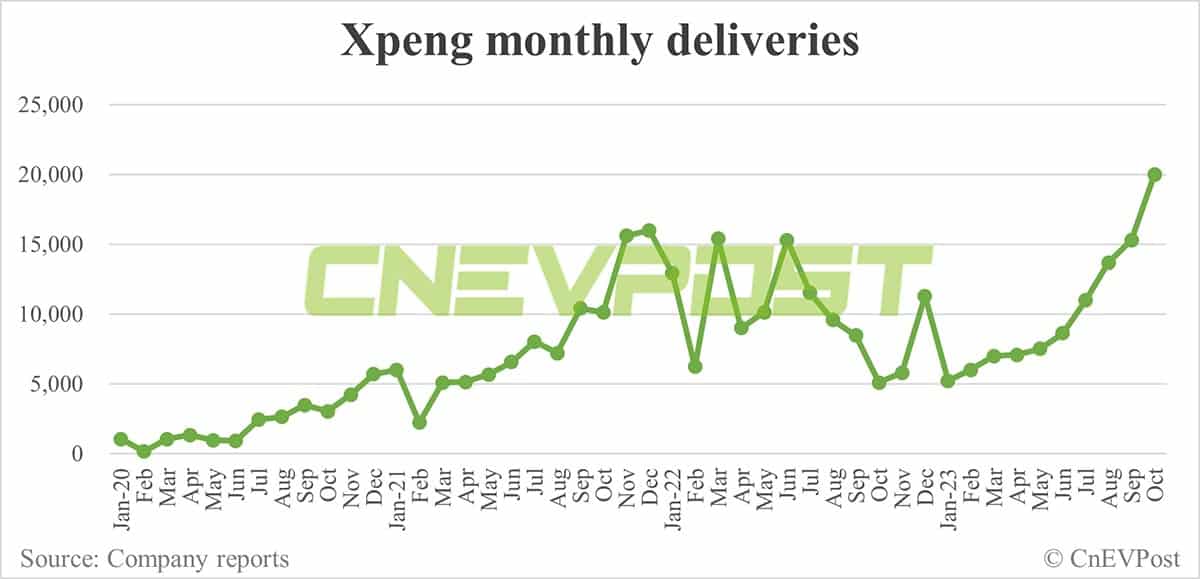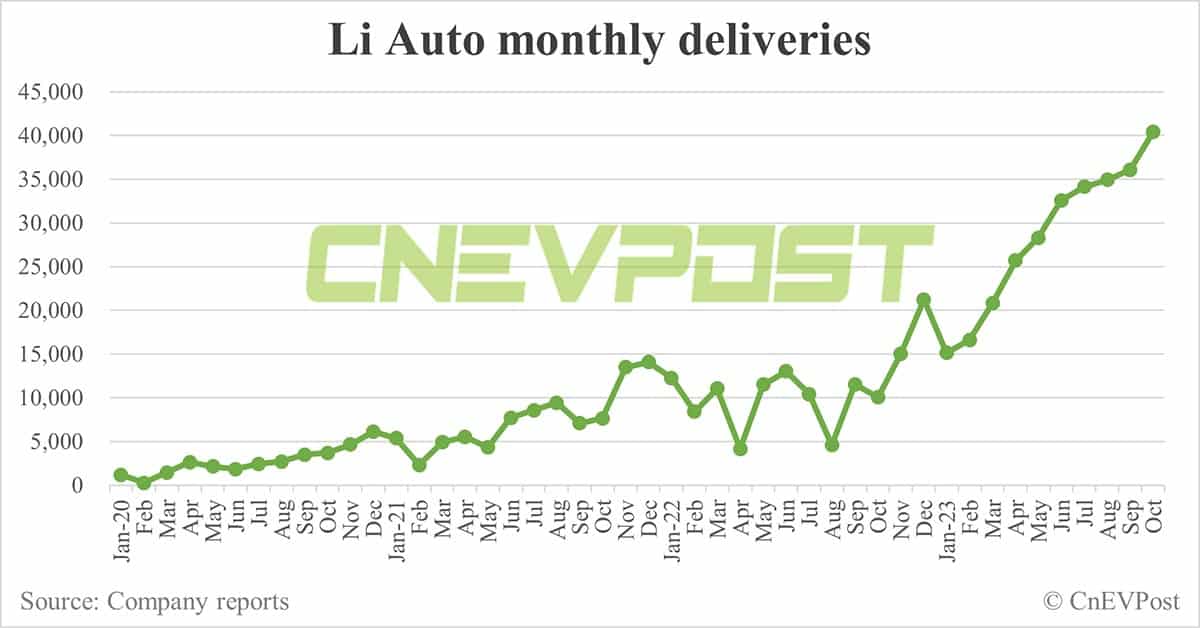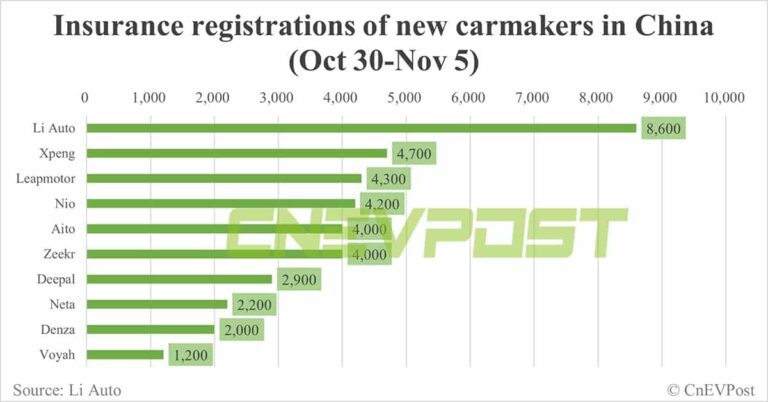Automakers usually provide high forecasts to their supply chain, while suppliers make their own judgments based on the competitiveness of the vehicle models and the operating results of the car companies.
The trio of US-listed Chinese electric vehicle (EV) makers have already sent their supply chains sales forecasts for 2024, with Li Auto (NASDAQ: LI) and Xpeng (NYSE: XPEV) both expecting significant sales growth next year, and Nio (NYSE: NIO) being relatively cautious, according to a local media report.
Nio provided its supply chain with a 2024 sales forecast of more than 230,000 units, Xpeng at more than 280,000 units, and Li Auto at more than 800,000 units, local media outlet 36kr said in a report today.
The sales forecast for Nio does not include the sub-brand codenamed Alps and Xpeng does not include the new brand codenamed Mona, the report noted.
In the fourth quarter of each year, car companies usually send their supply chain a sales plan for the following year so that suppliers can make material, capacity, staff and financial preparations.
An unspoken rule is that car companies usually give high forecasts, while the supply chain partners will make their own judgments based on the competitiveness of the models and the operating results of the car companies, the 36kr report noted.
Car companies may also adjust their sales forecasts based on the market situation, so these figures are more of just providing a reference, the report emphasized.
Nio's sales forecast of over 230,000 units for 2024 is more practical than its sales forecast of 240,000 units for this year, the report said.
Nio delivered 16,074 vehicles in October, up 59.80 percent year-on-year and up 2.77 percent from September. In the January-October period, Nio delivered 126,067 vehicles, up 36.3 percent year-on-year.
If Nio maintains October's deliveries in the last two months of the year, then full-year deliveries for 2023 will be 158,000 units, 36kr's report said, adding that on this basis, next year's 230,000-unit sales forecast represents a rise of about 50 percent.
Nio's sales next year will be supported entirely by the eight models currently on sale, meaning that it will need to maintain sales of nearly 20,000 per month without new model launches, the report noted.
Nio is restructuring and optimizing its team, reducing its investment in marginal businesses, and with small and rapid iterations underway across its businesses, it's not impossible to maintain 20,000 monthly sales next year, the report said.
Alps is expected to be a cash cow for Nio, whose first model, due for release in the second half of 2024, will be the first to be based on the NT 3.0 platform and will have more flexible pricing space, the report said.
For Xpeng, the company delivered 101,445 vehicles in the January-October period, down 2.13 percent year-on-year. It delivered a record 20,002 vehicles in October, up 292.12 percent year-on-year and 30.65 percent from September.
If it continues October's delivery performance, Xpeng is on track to deliver 140,000 units for the whole of 2023, 36kr's report said, adding that the company is expected to see a 100 percent increase in deliveries as per its forecast for next year.
In addition to the G3i, P5, P7 series, G9, and G6 currently on sale, Xpeng's new models for next year will include the X9 MPV and a large new sedan, according to 36kr.
On August 27, Xpeng announced that it will acquire the EV business of Chinese ride-hailing giant Didi Global and will launch a new brand based on the partnership between the two, targeting a market that sells for less than Xpeng's current models.
Xpeng plans to launch a new EV brand in 2024 and is currently developing the project name Mona, the company previously said.
The first model in the Mona program will be an A-segment smart EV model to be launched in 2024, the company said at the time, adding that the new model and brand will differentiate itself from Xpeng-branded products and the main brand.
For Li Auto, the company is expected to launch several new models in 2024.
Apart from the current three extended-range electric vehicle (EREV) models -- Li L9, Li L8 and Li L7 -- and the first battery-electric vehicle (BEV) model, Li Mega MPV, which will be launched at the end of the year, Li Auto will also have four new models to be launched next year, including the Li L6 EREV and three BEV models, the report said.
By the end of next year, Li Auto will have eight models on sale, the report said.
Li Auto's sales forecast for the Li Mega in 2024 is 80,000 units, and for all four BEV models next year is close to 150,000, according to 36kr.
Li Auto management said during a strategy meeting ahead of China's early October National Day holiday that the company is targeting sales of more than 3 million units by 2028, the report said, adding that such aggressive sales growth projections are rare in the industry.
However, Li Auto has not yet ventured into the BEV segment, and pure electric MPVs are an under-proven market, the report noted.
Li Auto still relies heavily on EREVs for its sales, and whether its all-electric MPVs will be accepted by the market needs to be proven, but it has more leverage on its hands than its peers, 36kr said.
Li Auto plans to officially launch the Li Mega in December, and the model will be available in stores in January next year, with deliveries starting in February, the company announced at the Chengdu auto show in August.
Li Auto delivered 40,422 vehicles in October, surpassing the 40,000 mark for the first time, up 302.13 percent year-on-year and up 12.1 percent from September.
From January to October, Li Auto delivered 284,647 vehicles, up 193.51 percent year-on-year.



